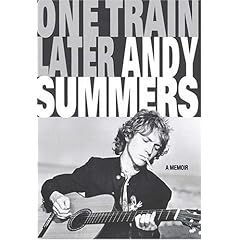Yesterday I finished reading Andy Summers' memoir, One Train Later. Of course, Andy Summers is the very talented guitar player from the Police. I was really excited about reading this, and apparently I wasn't the only one because I know the book made it to paperback. Based on the tone and style of writing, the book was obviously written with a ghost writer, which is probably just as well but definitely something to be aware of before reading. The wording is often too flowery and esoteric for its context, which can actually detract from the experience at times.
The book goes into a lot of depth about Andy Summers' life from the time he was born up until he joined the Police. This section of the book is surprisingly enjoyable as he was more accomplished a guitarist than I had known, playing in many bands, including the popular Animals. I was also surprised to find out how involved he was in the "peace and love" movement of 1960's Britain.
As a guitarist myself, I had a great appreciation of how fantastic a guitarist he was already. The first section of the book doesn't disappoint, exploring his influences, great discipline within his craft, and education in music. Thanks to the book I explored some of his classical and bassa nova recordings and was quite impressed with his ability. Andy Summers is a person who takes music very seriously.
Unfortunately once he joins the police the book takes on a "This happened, then that happened" statement of experiences and facts that often lack an arc and climax. If you are looking for insight into the dynamics between Andy, Sting, and Stewart this is not the book for you. In his writing Andy Summers is very disciplined about sharing only his most general feelings about the band. I was pretty disappointed in this section of the book, hoping for a more insightful analysis of events, similar to the recent Beatles biography by Bob Spitz. It seems that Andy Summers has chosen to take a more political tact, which I'm sure is good for his ongoing relationships with his ex-bandmates. Perhaps the role this book will play for Police enthusiasts will be as source material in future works by rock historians.
I am very interested in eastern religion and Buddhism in particular, and Andy Summers touches on this topic frequently. His sincerity of belief is obvious, and repeats throughout the book to show how reasonable and kind a person he truly is.
The book features an intro by The Edge of U2 fame, which is basically worthless and probably exists solely to enhance the book's sales.
Although this is not a book that will change lives or provide special insight, it was very enjoyable and would interest even those not particularly fond of the Police.


